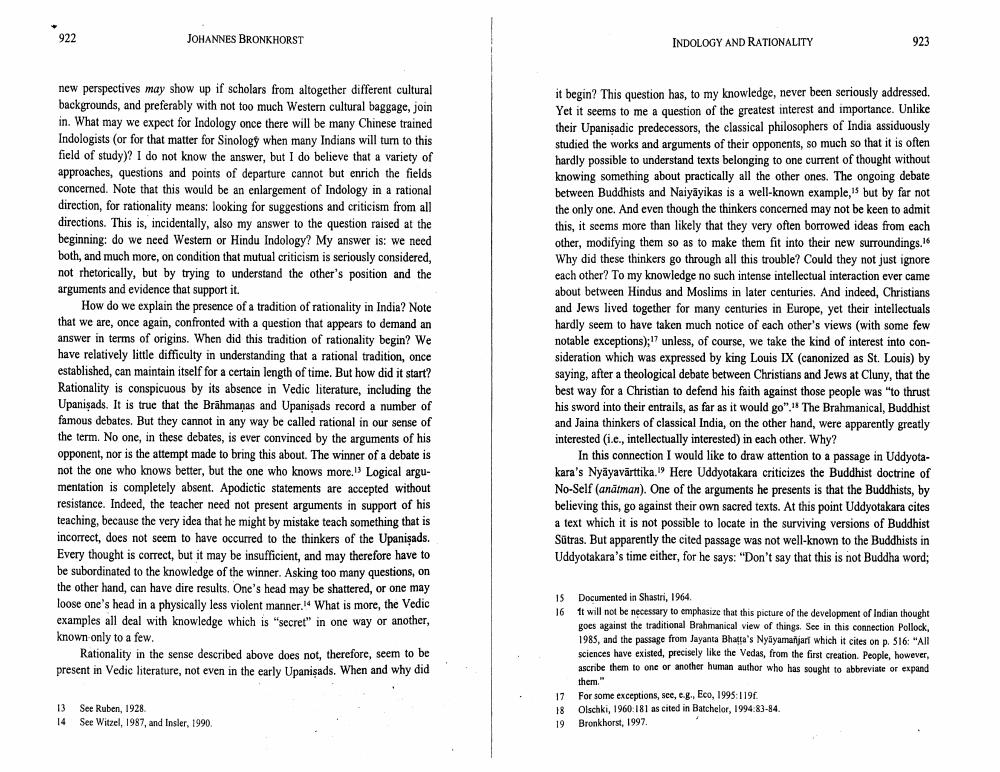Book Title: Indology And Rationality Author(s): Johannes Bronkhorst Publisher: Johannes Bronkhorst View full book textPage 4
________________ JOHANNES BRONKHORST INDOLOGY AND RATIONALITY new perspectives may show up if scholars from altogether different cultural backgrounds, and preferably with not too much Western cultural baggage, join in. What may we expect for Indology once there will be many Chinese trained Indologists (or for that matter for Sinology when many Indians will turn to this field of study)? I do not know the answer, but I do believe that a variety of approaches, questions and points of departure cannot but enrich the fields concerned. Note that this would be an enlargement of Indology in a rational direction, for rationality means: looking for suggestions and criticism from all directions. This is, incidentally, also my answer to the question raised at the beginning: do we need Western or Hindu Indology? My answer is: we need both, and much more, on condition that mutual criticism is seriously considered, not rhetorically, but by trying to understand the other's position and the arguments and evidence that support it. How do we explain the presence of a tradition of rationality in India? Note that we are, once again, confronted with a question that appears to demand an answer in terms of origins. When did this tradition of rationality begin? We have relatively little difficulty in understanding that a rational tradition, once established, can maintain itself for a certain length of time. But how did it start? Rationality is conspicuous by its absence in Vedic literature, including the Upanişads. It is true that the Brāhmaṇas and Upanişads record a number of famous debates. But they cannot in any way be called rational in our sense of the term. No one, in these debates, is ever convinced by the arguments of his opponent, nor is the attempt made to bring this about. The winner of a debate is not the one who knows better, but the one who knows more. Logical argumentation is completely absent. Apodictic statements are accepted without resistance. Indeed, the teacher need not present arguments in support of his teaching, because the very idea that he might by mistake teach something that is incorrect, does not seem to have occurred to the thinkers of the Upanişads. Every thought is correct, but it may be insufficient, and may therefore have to be subordinated to the knowledge of the winner. Asking too many questions, on the other hand, can have dire results. One's head may be shattered, or one may loose one's head in a physically less violent manner. What is more, the Vedic examples all deal with knowledge which is "secret" in one way or another, known-only to a few. Rationality in the sense described above does not, therefore, seem to be present in Vedic literature, not even in the early Upanişads. When and why did it begin? This question has, to my knowledge, never been seriously addressed. Yet it seems to me a question of the greatest interest and importance. Unlike their Upanisadic predecessors, the classical philosophers of India assiduously studied the works and arguments of their opponents, so much so that it is often hardly possible to understand texts belonging to one current of thought without knowing something about practically all the other ones. The ongoing debate between Buddhists and Naiyayikas is a well-known example, but by far not the only one. And even though the thinkers concerned may not be keen to admit this, it seems more than likely that they very often borrowed ideas from each other, modifying them so as to make them fit into their new surroundings.16 Why did these thinkers go through all this trouble? Could they not just ignore each other? To my knowledge no such intense intellectual interaction ever came about between Hindus and Moslims in later centuries. And indeed, Christians and Jews lived together for many centuries in Europe, yet their intellectuals hardly seem to have taken much notice of each other's views (with some few notable exceptions):" unless, of course, we take the kind of interest into consideration which was expressed by king Louis IX (canonized as St. Louis) by saying, after a theological debate between Christians and Jews at Cluny, that the best way for a Christian to defend his faith against those people was "to thrust his sword into their entrails, as far as it would go"." The Brahmanical, Buddhist and Jaina thinkers of classical India, on the other hand, were apparently greatly interested i.e., intellectually interested) in each other. Why? In this connection I would like to draw attention to a passage in Uddyotakara's Nyayavarttika." Here Uddyotakara criticizes the Buddhist doctrine of No-Self (anātman). One of the arguments he presents is that the Buddhists, by believing this, go against their own sacred texts. At this point Uddyotakara cites a text which it is not possible to locate in the surviving versions of Buddhist Sütras. But apparently the cited passage was not well-known to the Buddhists in Uddyotakara's time either, for he says: "Don't say that this is not Buddha word; 15 16 Documented in Shastri, 1964 ft will not be necessary to emphasize that this picture of the development of Indian thought goes against the traditional Brahmanical view of things. See in this connection Pollock, 1985, and the passage from Jayanta Bhatta's Nyayamanjarf which it cites on p. 516: "All sciences have existed, precisely like the Vedas, from the first creation. People, however, ascribe them to one or another human author who has sought to abbreviate or expand them." For some exceptions, sce, eg, Eco, 1995:1198 Olschki, 1960:181 as cited in Batchelor, 1994.83-84. Bronkhorst, 1997 13 14 See Ruben, 1928 See Witzel, 1987, and Insler, 1990, 17 18 19Page Navigation
1 2 3 4 5 6 7 8 9 10 11 12 13
